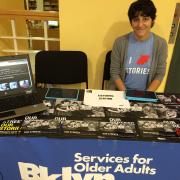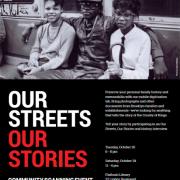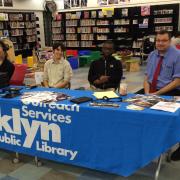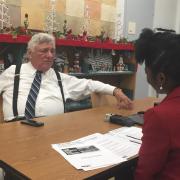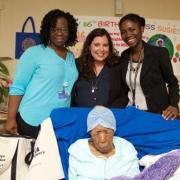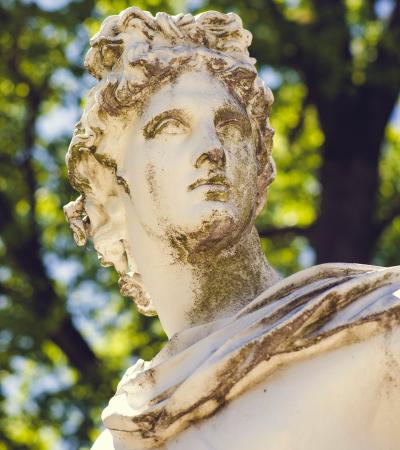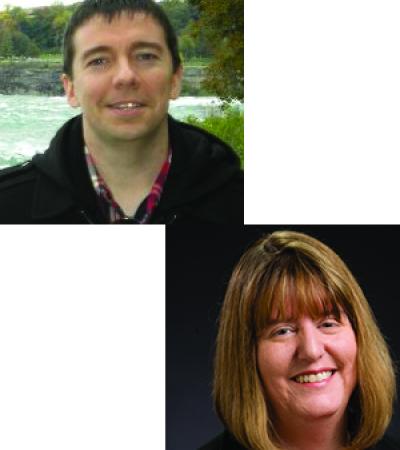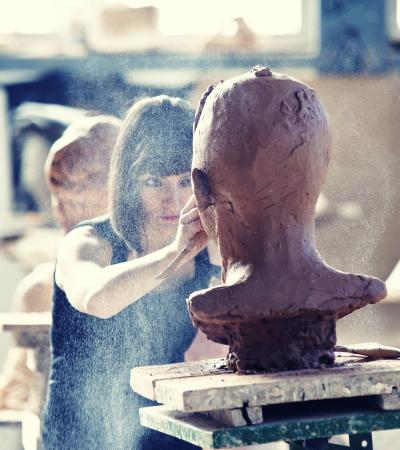Intergenerational
Our Streets, Our Stories: A Brooklyn Neighborhood Oral History Project
$5,000+
Editor's note: To learn more about starting an oral history program, view this 60-minute webinar.
Our Streets, Our Stories is an ongoing oral history project housed in the Brooklyn Public Library (BPL) Services for Older Adults within the Department of Outreach Services. We seek to explore the Brooklyn that is and the Brooklyn that was, from the words of the community that lives here.
The project aims to actively collect a broad range of stories from our diverse neighborhoods in the form of audio interviews so that future generations may better understand the history of this great borough. We compile these narratives on Tumblr, SoundCloud and iTunes.
Advanced Planning
The primary goal of this program is to leverage BPL’s unique position as a network of free and open public gathering spaces for local Brooklyn communities, as well as our mandate as a system of public libraries to preserve and disseminate information and stories. We viewed the project, managed by Coordinator of Older Adult Services Taina Evans, as a way to deepen our commitment to and relationships with older adult patrons.
The initial project phases began in 2013 with a team of one to two Outreach Services employees. The employees worked with a handful of branch managers to build community contacts and implement volunteer trainings on interviewing techniques. This initial version of the project lost momentum due to constraints on employee time resources, but with the hiring of two part-time program assistants, we were able to re-launch the program into its current form in late 2014.
In its current iteration, the primary project leaders rotate through different Brooklyn neighborhoods every few months. While focusing on a specific neighborhood, the project staff utilizes the community knowledge and connections of branch staff to market to, invite and network with community members and organizations to participate in the project. (View photos of the project from the Photo Slideshow at right.)
Marketing
We promote the project through a variety of methods since it’s an ongoing endeavor. We currently have business cards with the project logo, email address, phone number and websites listed on them, which project staff members carry with them to events and meetings. For specific events, we often ask BPL’s marketing department to design posters, and we also maintain a standard flier template that we can print for spontaneous or smaller-scale project events. In the early phases of the project, we conducted extensive grassroots outreach by handing out fliers and disseminating information door-to-door or via phone and email with specific community groups that were suggested to us by local community members. These community groups include churches, nonprofits and community gardens.
Our primary aim is to record interviews, but the form that our presence takes varies greatly depending on the community or partner organizations. In the past, we have held drop-in hours, spoken at neighborhood board meetings and tabled at community fairs. We also partner with BPL's Brooklyn Collection to hold community scanning events, where patrons can scan family documents, photographs and 3D memorabilia. The method of marketing we use depends on the particular event type and community, but we find that our marketing is most successful when we have a personal connection, conversation or referral that leads us to interested patrons.
Budgeting
Our Streets, Our Stories is funded by a grant from the John S. and James L. Knight Foundation and The Charles H. Revson Foundation. Here’s how our budget breaks down:
- three ZOOM H6 Handy Recorders for recording interviews: $340 each ($1,020 total)
- three-year Accidental Damage Protection for the ZOOM Recorders: $69.99 each ($209.97 total)
- two iPad Minis for displaying interview and website content at events and tabling: $250 each ($500 total)
- two pairs of headphones for the iPads at the listening stations at events and tabling: 99 cents each ($1.98 total)
- one banner with the department logo to enhance our display table at events: $100 to $200
- four boxes of business cards with our project logo and contact information: $275
- marketing materials, including postcards and posters for different project events: $1,000
- one stack of CD-R’s for occasional CD copies of interviews offered to interested interviewees: $16
- two part-time staff members whose time is either fully or partially dedicated to the project: $20 per hour at a maximum of 19 hours per week (approximately $1,200 per month each)
Our program is intended to be an ongoing, multi-year endeavor and many of these purchases were made gradually as the program expanded. Therefore, many of these costs could be reduced by purchasing fewer items, scaling back marketing efforts or dedicating fewer staff members, depending on the scope of your unique project.
Day-of-event Activity
At most events, we have two staff members tabling and accepting walk-in or appointment interviews with individual patrons. This allows one staff member to remain at the table while the other is free to conduct interviews. Our table set-up has evolved, but it currently consists of an Outreach Services banner, project postcards, business cards and iPads. The iPads serve as listening stations with headphones to hear previous interview samples. They also feature our Tumblr and SoundCloud accounts.
Our biggest challenges on the day of an event are typically participant turnout and noise pollution in the event space. The interviews themselves require a separate space that is as quiet as possible; we try to minimize background noise by conducting interviews in a space away from the main flow of people, such as an office or a meeting room within a library branch. We also print a sign-up sheet to write contact information for any patrons who would like to record an interview at a later date. We aim to conduct 30-minute interviews per participant, which can pose a challenge in terms of how many interviews we are able to do at a given event, and conversely, whether patrons are willing to stop by the table and take the time to speak for that length of time.
For our interviews, we usually start with a question that brings the interviewee back to the begining of his or her time in Brooklyn, such as "What is your Brooklyn story?" or "Where were you born?" Typical, the Our Streets, Our Stories oral history team doesn't work from a pre-determined list of questions. We do have an interview guide with ideas to help prompt new volunteers, but we try to keep the interviews more fluid and adaptable. For every oral history interview, a release form must be signed by the participant and interviewer. (View the BPL release form under Attachments at right.)
Program Execution
Our attendance varies depending on the type of event we participate in. Since the project is ongoing, our main focus is on following up and connecting with interested individuals through a variety of methods. The project, to date, has collected more than 70 interviews and counting. On an individual event day, we record two to four interviews on average.
A unique challenge we have discovered is that different methods of marketing and outreach work for different neighborhoods, communities and organizations. Additionally, when working with older adults, we have had to consider what non-digital methods of outreach function best to enable older adult patrons to learn about and participate in the project. The same can be said for the way in which we structure our presence at events. We often work in partnership with outside organizations and internally with the Brooklyn Collection, the local history division of BPL, which organizes community scanning events to preserve local material history, such as photos and documents. In these partnerships, the structure of what we do on the day of an event varies. While the interview process is consistent, the challenges of how to encourage people to participate in the project and how to record a quality interview in a given environment widely vary.
We do not currently have an evaluation component in place for the project, but our department collects program statistics on a monthly basis for institutional record keeping. The statistics we currently track are number of interviews collected, partnerships, events in a given month, play count on our SoundCloud and follower counts on our Tumblr and SoundCloud accounts.
Our work does not go unnoticed. Our Streets, Our Stories was a nominee for the 2016 Outstanding Achievement in the Radio Program/Podcast category at the annual Guides Association of NYC 2016 Apple Awards.
Advice
The oral history interview process is largely based on trust between your institution, the staff conducting the interviews and the community you are hoping to work with. We have occasionally been met with fear or doubt surrounding our intentions, the equipment we use and the legal language involved in our consent forms. Develop strong, accessible language for why the project is important, what you hope to do and how you plan to do it.
Most importantly, know the community you are trying to work within and figure out how to bring the project to them in a way that makes the most sense. Leverage community partners to build trust around the project and suddenly you will find that each person wants to refer 10 more people to you, because preserving our local memory and heritage is a mission everyone can get behind.
Supporting Materials
- Feedback (Coming Soon!)
- Programming Librarian Facebook Group

